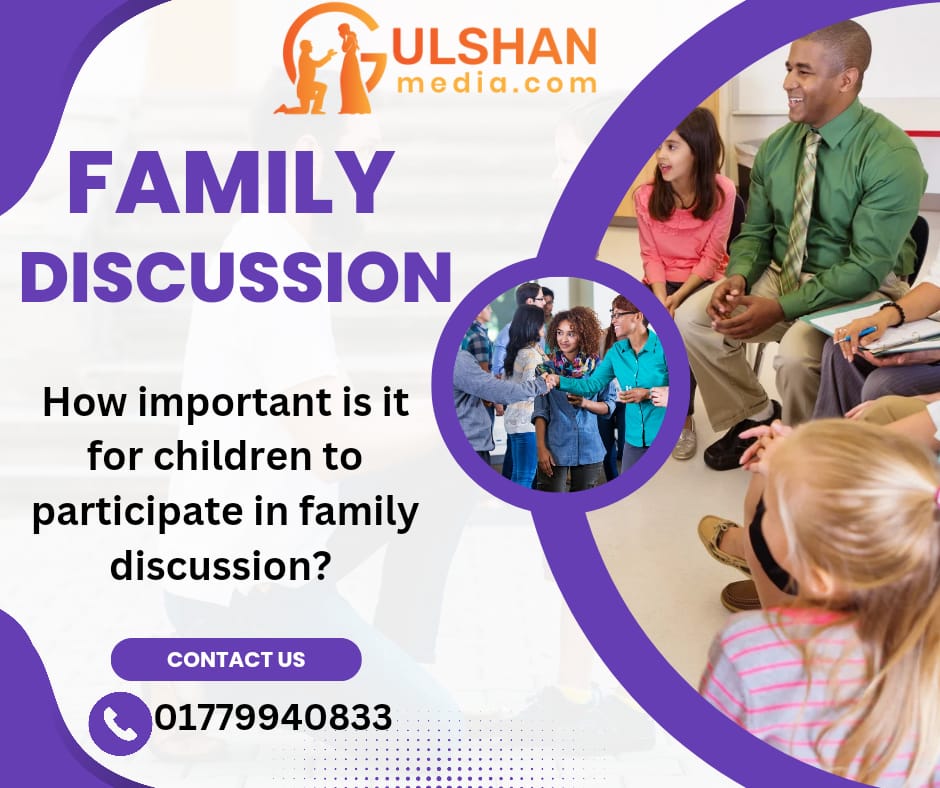How important is it for children to participate in family discussions?
How important is it for children to participate in family discussions?

Family of four gathered in a living room, having a happy conversation
It is crucial for children to be actively involved in family discussions. Engaging children in family conversations fosters their social, emotional, and cognitive development. It also helps them develop essential communication skills and strengthens family bonds. Family is often considered the cornerstone of an individual’s life, and it serves as a primary source of support, socialization, and emotional development. Within this familial context, participation in family discussions plays a crucial role in a child’s overall development. Encouraging children to be active contributors to family conversations can have a profound impact on their emotional intelligence, communication skills, and sense of belonging. In this essay, we will delve into the various facets of why it is essential for children to participate in family discussions, and how this involvement shapes their future.
Benefits of children participating in family discussions:
- Improved communication skills: Family discussions provide children with a safe and supportive environment to practice their communication skills. They learn how to express their thoughts and feelings clearly and respectfully, listen attentively to others, and engage in constructive dialogue.
- Enhanced social and emotional development: Participating in family discussions helps children develop their social and emotional intelligence. They learn how to empathize with others, resolve conflicts peacefully, and manage their emotions effectively.
- Boosted self-confidence: When children feel valued and heard, it boosts their self-confidence. They feel more comfortable expressing their opinions and ideas, which contributes to their overall well-being.
- Strengthened family bonds: Family discussions create opportunities for bonding and connection. When families share their thoughts and feelings openly, it strengthens their relationships and creates a sense of unity.
- Improved decision-making skills: Involving children in family discussions exposes them to different perspectives and viewpoints. This helps them develop their critical thinking skills and make informed decisions.
Tips for encouraging children to participate in family discussions:
- Create a welcoming and inclusive environment: Make sure children feel comfortable and safe to express themselves. Avoid interrupting or criticizing them, and encourage them to share their thoughts without fear of judgment.
- Use open-ended questions: Instead of asking questions with simple yes or no answers, use open-ended questions that encourage elaboration and discussion. For example, instead of asking, “Did you have a good day at school?”, ask, “What was the most interesting thing you learned at school today?”
- Active listening: When children are speaking, give them your undivided attention. Maintain eye contact, nod your head, and avoid distractions. Show them that you are interested in what they have to say.
- Respectful communication: Model respectful communication by listening attentively to others, avoiding interrupting, and expressing your opinions without being aggressive or dismissive.
- Make it a regular practice: Set aside regular times for family discussions, such as during mealtimes or family game nights. This will help children form a habit of sharing their thoughts and ideas.
Tips for dealing with difficult conversations:
- Choose the right time and place: Avoid having sensitive conversations when family members are tired or stressed. Find a quiet and private space where everyone can focus on the discussion.
- Establish ground rules: Set clear guidelines for respectful communication, such as no interrupting, no personal attacks, and everyone getting a chance to speak.
- Focus on the issue, not the person: When addressing a problem, focus on the specific behavior or issue rather than criticizing the individual. This helps to avoid personal attacks and keep the discussion productive.
- Use “I” statements: Instead of using accusatory “you” statements, use “I” statements to express your feelings and concerns. For example, instead of saying, “You’re always leaving your mess everywhere,” try saying, “I feel frustrated when I have to clean up after you.”
- Seek professional help if needed: If family discussions are consistently tense or unproductive, it may be helpful to seek professional guidance from a family therapist or counselor.
Development of Communication Skills
One of the most apparent benefits of involving children in family discussions is the development of their communication skills. Engaging in conversations with parents and siblings helps children learn how to express their thoughts and feelings effectively. It also teaches them the importance of active listening, empathy, and respecting diverse perspectives. These skills are fundamental for their success in both personal and professional relationships in the future.
Building Confidence
Participation in family discussions can boost a child’s self-esteem and confidence. When children are encouraged to express their opinions and are acknowledged and respected by their family members, they gain a sense of self-worth. This sense of value in the family setting can have a lasting impact on their self-esteem, making them more likely to voice their thoughts in other areas of their lives.
Fostering Critical Thinking
Engaging in family discussions exposes children to a variety of ideas and viewpoints. It encourages them to think critically about different topics and formulate their own opinions. This process of critical thinking is essential for problem-solving and decision-making in life. Children who participate in family discussions are more likely to develop the ability to analyze situations, consider consequences, and make informed choices.
Strengthening Emotional Bonds
Participating in family discussions provides children with the opportunity to connect with their parents and siblings on a deeper level. Sharing thoughts, feelings, and experiences can strengthen the emotional bonds within the family. These bonds create a sense of security and belonging, which is crucial for a child’s emotional well-being. It also ensures that children are more likely to seek guidance and support from their family members when faced with challenges.
Enhancing Empathy and Understanding
Listening to the perspectives and experiences of family members can enhance a child’s empathy and understanding of others. When children participate in family discussions, they learn to appreciate the diversity of thoughts and experiences within their own family. This exposure to different viewpoints fosters tolerance and open-mindedness, which are valuable qualities in an increasingly diverse world.
Educating on Important Values and Morals
Family discussions often revolve around topics that pertain to values, morals, and ethical principles. When children actively engage in these discussions, they have a better opportunity to internalize the family’s values and ethics. This education in values is critical for their moral development and helps them differentiate between right and wrong.
Encouraging Accountability
Participating in family discussions also introduces children to the concept of accountability. When they express their thoughts and opinions, they learn to take responsibility for their words and actions. This accountability is a crucial life skill that will serve them well as they grow and interact with the world outside their family.
Practicing Conflict Resolution
Disagreements and conflicts are an inevitable part of family life. When children are encouraged to participate in discussions, they learn how to manage and resolve conflicts in a healthy manner. This ability to engage in constructive discussions and find common ground is invaluable for their interpersonal relationships in the future.
Preparation for Life Outside the Family

Family discussions serve as a training ground for children, preparing them for the world beyond their immediate family. Active participation in family conversations teaches them how to interact with a diverse range of individuals, a skill that will be invaluable as they enter school, engage with peers, and eventually enter the workforce.
Promoting Personal Responsibility
Involving children in family discussions often means assigning them responsibilities, such as making decisions or contributing to the family’s well-being. This promotes a sense of personal responsibility and encourages them to take an active role in shaping their own lives.
Building a Sense of Belonging
When children actively participate in family discussions, they feel that their opinions matter and that they belong. This sense of belonging can be a source of emotional support and comfort, especially during challenging times.
Encouraging Goal Setting
Family discussions can also involve setting goals, both individually and as a family. This helps children understand the importance of planning, working towards objectives, and achieving success.
Strengthening Problem-Solving Skills
Through family discussions, children have the opportunity to engage in problem-solving. They can offer solutions and work collaboratively with their family members to find resolutions to various issues, which is a valuable skill to possess throughout life.
Instilling Civic Responsibility
Family discussions can extend beyond personal matters to broader issues affecting society and the world. Encouraging children to participate in these discussions can instill a sense of civic responsibility and a desire to contribute positively to their communities.
Fostering Adaptability
When children actively participate in family discussions, they learn to adapt to changing situations and accommodate diverse perspectives. These adaptable individuals are better equipped to face the challenges and uncertainties of the future.
Conclusion
Encouraging children to participate in family discussions is an investment in their future. By providing them with opportunities to express themselves, listen to others, and engage in respectful dialogue, we are helping them develop the skills they need to thrive in life.The importance of children’s participation in family discussions cannot be overstated. It is a holistic process that shapes their communication skills, emotional intelligence, values, and attitudes. By participating in family conversations, children are not only contributing to their own personal growth but also building a strong foundation for meaningful and successful relationships in their future. It is the responsibility of parents and caregivers to create a welcoming and inclusive environment where children are encouraged to share their thoughts, learn from others, and grow as responsible and empathetic individuals. In doing so, families play a pivotal role in shaping the next generation, preparing them for a world where effective communication and interpersonal skills are more vital than ever.
“বিয়ে সংক্রান্ত যেকোনো তথ্য ,সেবা এবং পরামর্শ পেতে যোগাযোগ করুন গুলশান মিডিয়ার সাথে। ” কল করুন: 01779940833
Email : gulshanmedia2@gmail.com








